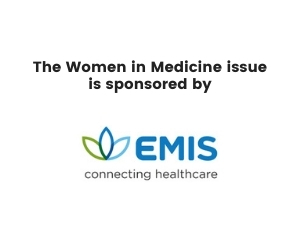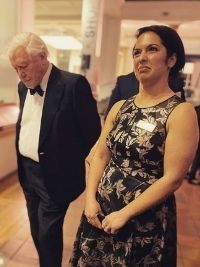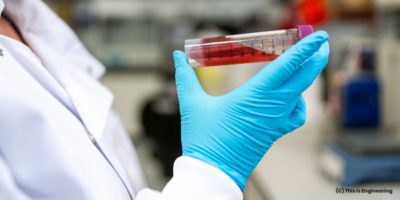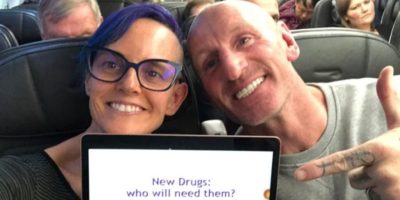Rachel Lambert-Forsyth is chief executive of the British Pharmacological Society, the primary UK learned society for pharmacologists concerned with research into drugs and the way they work. Rachel is also managing director of BPS Assessment, the Society’s learning and assessment business. Previously, she worked as director of membership and professional affairs at the Royal Society of Biology and company secretary for Charles Darwin House Ltd.

“Previous reports undertaken by the British Pharmacological Society identified that 58% of pharmacology students are women and that this high percentage continues on into the early years of training, PhD and postdoctoral research. However, there was a subsequent decline in numbers at leadership levels.”
Combining science with policy
Graduating from the University of Plymouth with a BSc in Marine Biology and Coastal Ecology, I was keen to combine my scientific education with real-life application outside of the lab or fieldwork sector. I undertook an MSc in Sustainable Environmental Management and it was my work-based module, based at Devon County Council, that gave me an insight into how I could combine science with policy and move from research into a science-related role.
I was lucky and after a fairly short job search, I landed an administration role at the Institute of Biology in 2008. They were going through some changes and a year later following a merger with another life science organisation became the Society of Biology.
A fire in my belly
Luck struck again, I was promoted to head of education with little real experience but a fire in my belly to work hard and grow the new society’s influence. Over the next 11 years, I progressed through the Society (now known as the Royal Society of Biology), finally holding the position of director of membership and professional affairs.
In March 2020 I joined the British Pharmacological Society as their new CEO, my first day coinciding with the government-mandated closure of offices. I have spent the last six months working remotely and ensuring that the Society continues to support its members throughout the pandemic and amplifies the work of pharmacologists in the discovery and use of medicines and therapeutics.
From 20 members to more than 4000
Founded in 1931, by a group of around 20 pharmacologists with the intention of meeting annually to read and discuss pharmacological papers and promote friendly collaboration between pharmacologists, the Society has grown in the last 90 years to a global pharmacological society with over 4000 members across 60 countries worldwide.
Our vision is a world in which pharmacology and therapeutics drive and support progress in science, medicine and healthcare and we are working with integrity to create global scientific, health and economic impact.
We do this by supporting academic and industrial drug discovery, improving outcomes for patients in relation to the therapeutic use of medicines; widening participation in pharmacology and therapeutics to ensure a vibrant and diverse community and workforce.
We also increase the visibility and influence of pharmacology and therapeutics through excellence in education, publishing, scientific meetings, communications, membership, and policy with public engagement.
My role as chief executive
Working closely with our trustee board and the senior management team, I am responsible for delivering the vision, mission and strategy of the British Pharmacological Society, and its subsidiary company, BPS Assessment Ltd.
What that means in practice is that I work with our staff team to support them to do their jobs, bringing to life the strategy of the organisation and ensuring that all parts are working towards the same goals. This often means that I spend a lot of time in meetings, checking in with team members, reading update reports and discussing the future direction of travel for various campaigns and projects.
I am also one of the key external faces of the Society, alongside our president (who holds their term of office for two years, with a two-year lead-in as president-elect) and therefore will spend some time each day drafting, reviewing or sharing messages across our Society communication platforms as well as my own social media channels.
BPS’ annual review 2019
2019 was a year of considerable achievement which I cannot take any credit for as I joined in 2020 and my thanks go to the previous chief executive who led the organisation during that time. As the second year of our strategy, 2019 was a time for consolidation of the first year, as well as vigorous activity for the future.
The Society demonstrated our commitment to serving our members, who remain at the heart of our organisation. We worked hard to build valuable networks for the pharmacology community.
Two key highlights came at the end of 2019: the announcement of our partnership with the European Laboratory Research & Innovation Group (ELRIG), and the creation of a new digital communities platform where members and the Society can communicate, collaborate and support each other. There is much more that the Society achieved over the last year and our annual report is a great place to find out more.
Pharmacology 2020
Our flagship annual meeting is Pharmacology 2020; normally we host this in-person but the challenges of COVID-19 have meant that we have converted this to an exciting multi-day, online meeting that will offer a combination of scientific sessions and interactive workshops, alongside social content such as desk yoga and the Flavour Explorer Experience.
By running the meeting this way, we will be able to gather our pharmacology family together and share research as we do every year, while accounting for changes brought about by the COVID-19 pandemic. We also hope that this will bring our annual meeting to an even wider global audience, including those who may not have been able to travel for a face-to-face meeting.
Our meetings team, alongside our members and led by our vice president for meetings, a role elected from the membership, have been working hard to identify the right digital partner for this meeting. They have been working with our speakers to pre-record and schedule live sessions over the stretched time period in December, and working with our sponsors to ensure that they are provided with a vibrant exhibition space.
A key part of our meetings is also the poster session, an opportunity for early-career pharmacologists to present their science and receive feedback from the wider pharmacological community. We have been working hard to ensure their needs are taken into consideration, and that prominence is given to the poster sessions to ensure they benefit professionally from these sessions.
Representation in the pharmacological sector
The first objective set out in the Society’s current five-year strategy for 2018-2022, is “To remove barriers to participation and success, while welcoming equality and celebrating diversity, and being inclusive in all we do”. The issue of representation – for socioeconomic, gender, ethnicity, and other identity characteristics – is an ongoing challenge within pharmacology, and the science community more widely.
Previous reports undertaken by the British Pharmacological Society, identified that 58% of pharmacology students are women and that this high percentage continues on into the early years of training, PhD and postdoctoral research. However, there was a subsequent decline in numbers at leadership levels.
We offer bursaries for childcare while members attend our meetings and there is also a bespoke membership option that members can access to support them during periods of breaks from their careers. But we know that to address the root cause of the problem will take longer.
We will shortly be launching our new vision for equality, diversity and inclusion (EDI), where we are taking a much broader but also more nuanced approach to our goals. Ultimately, we want pharmacology to be an attractive profession to all individuals regardless of their identity.
This vision will ensure that we take an active approach, placing equality, diversity and inclusion at the heart of pharmacology, whether in terms of the opportunity for a successful career (in pharmacology or at the Society) or in benefitting from pharmacology research.
Supporting our members throughout the pandemic
Right at the outset, we put in place a proactive plan to protect and reduce risk to our members and staff, while continuing our services during the COVID-19 outbreak. In March 2020, in line with UK Government guidance, our offices at Angel Gate in London were closed and will remain closed until at least March 2021. We looked to convert, where possible, our scientific meetings and workshops to virtual settings to ensure we continued to provide our members with engaging content.
An immediate decision was to make journal articles relevant to COVID-19 in the British Journal of Pharmacology and the British Journal of Clinical Pharmacology, free to access. (Pharmacology Research and Perspectives is already entirely open access.)
We also planned to launch a new digital community in 2020 and this ended up being extremely timely. In May we launched this with our full membership providing them with a networking platform to share and connect with staff and other members in a time when we haven’t been able to meet face to face.
Importantly, we were aware that many of our members are supporting the efforts to find therapeutic solutions for COVID-19, from clinical members on the front line to members sharing their expertise with policymakers to help drive decision making and much more. Our COVID Hub allowed us to communicate opportunities to our members as well reach out to them and share their stories.
October 11th – 17th is Clinical Pharmacology Week and we have been using this social media campaign to highlight the role of clinical pharmacology in the COVID-19 pandemic response.
Looking forward
I feel incredibly lucky to be working with a fabulous team and a motivated and engaged membership. 2020 has thrown every possible challenge it can at our members and staff, and like many other organisations the primary priority for this year is supporting them in whatever way we can.
Looking forward, I would like to see us amplify the role of our members during this period, ensuring that the wider public understands and appreciates the vast and varying roles that pharmacologists play in ensuring they receive safe and effective drugs and medicines.
I would like to grow our influence in partnership with our strategic partner, ELRIG, bringing the industrial, academic, and clinical communities together for the benefit of all.
Finally, we will be working to communicate the exciting opportunities that a pharmacology career can offer to the next generation of scientists, and through our equality, diversity and inclusion work ensure that the profession reflects the vibrancy and diversity of humankind.
https://twitter.com/britpharmsoc








